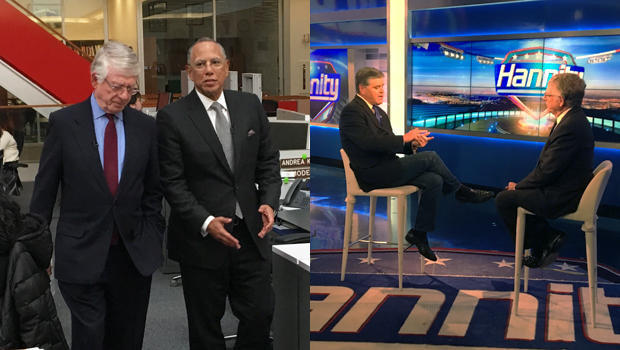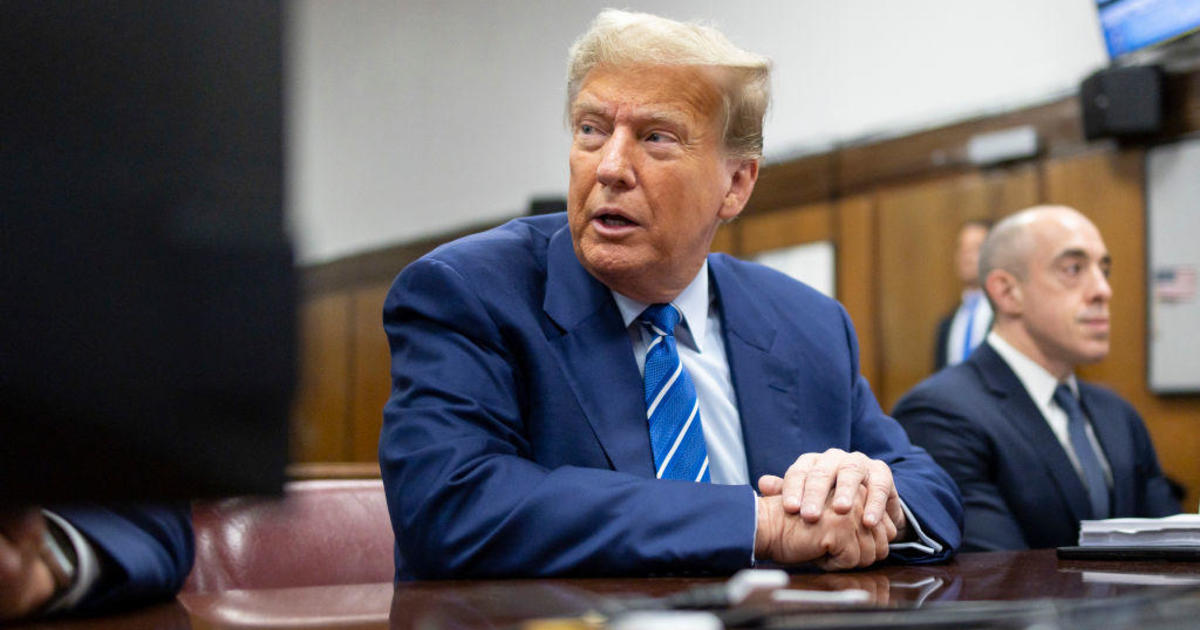The great divide: Politics in the Age of Trump
As this past week’s battle over health care proves, the great divide in American politics shows no sign of healing, or even of quieting down. Our Cover Story is reported by “Sunday Morning” Senior Contributor Ted Koppel:
Increasingly, we Americans occupy alternate universes.
President Trump: “To be honest, I inherited a mess! It’s a mess!”
Stephen Colbert: “No, you inherited a fortune; we elected a mess.”
There is very little common ground left … only battling perceptions of reality.
Neither side seems to have much use for the other. And in this age of the Internet and cable TV, very little is out of bounds:
John Oliver: “Donald Trump -- America’s wealthiest hemorrhoid.”
Michael Savage: “Democrats want to dissolve the borders. Isn’t that what they wanted? Open borders? Isn’t that what that snake Obama did?”
And there are legions driving the country further and further apart.
Tomi Lahren: “President Trump has still done more for this country in the last 40 days than Barack Obama did in eight years.”
A Pew study finds 81% of voters say they cannot agree with the other side on basic facts, which may owe something to the president’s campaign against “fake news.”
CNN’s Jim Acosta: “Just because of the attack of fake news and attacking our network, I just want to ask you, sir …
President Trump: “I’m changing it from ‘fake news,’ though. ‘Very fake news.’”
There’s nothing new about simmering hostility between a President and the press. As Richard Nixon once stated, “The President should treat the press just as fairly as the press treats him.”
In March of 1974, the Nixon presidency was lurching toward destruction by Watergate, and there was an ongoing tension between the President and the CBS White House correspondent:
President Nixon: “Are you running for something?”
Dan Rather: “No, sir, Mr. President, are you?”
Norm Ornstein, a resident scholar at the American Enterprise Institute, was then, and remains now, a student of our political system and our media:
“We would watch network news shows and we would sit there and we would have basically a common set of facts that would emerge from them,” he said. “As we’ve moved to the new media world, the more you’ve got this cacophony of voices, the more you cut through it by, basically, shock value. And that’s why people now are driven not by their own attachment to their own parties; they’re driven by a hatred for those on the other side.”
Sean Hannity: “Democrats, the alt-left, propaganda, ‘destroy Trump’ media, continue to ignore facts in what has clearly now become a political witchhunt.”
Sean Hannity’s television program on Fox has a nightly audience of 2.9 million viewers. He has, from the first, promoted Donald Trump and a highly-partisan agenda.
“Honestly, I think liberalism has to be defeated,” Hannity told Koppel. “Socialism must be defeated in a political sense. We don’t want a revolution in this country.”
“But what more do you want? You got the White House, you got the House, you got the Senate.”
“We do for now. And then we have angry snowflakes, and then we’ve got a Democratic establishment. I say the press in this country is out to destroy this president.”
Scott Pelley: “Well, the president’s real troubles again today were not with the media, but with the facts.”
Shephard Smith: “It’s absolutely crazy. He keeps repeating ridiculous throwaway lines that are not true at all.”
Fareed Zakaria: “I think the President is somewhat indifferent to things that are true or false. He has spent his whole life bullsh***ing. He has succeed by bullsh***ng.”
Rush Limbaugh: “They live in two separate worlds, and they don’t understand Trump’s.”
Rush Limbaugh had a lot to do with creating those two separate worlds. But he couldn’t have done it until 1987, when the Federal Communications Commission did away with the so-called Fairness Doctrine.
“The Fairness Doctrine basically said that people on radio and television, if they present one political point of view, had to balance it with the opposite political point of view,” said Ornstein.
Free of the Fairness Doctrine, Limbaugh and conservative talk radio exploded into a political force of nature. Now, Ornstein said, “you take conservative talk radio, move that forward to tribal cable television, and then layer onto that email and social media, and all of a sudden we live in a world where people can get information and believe it’s absolutely true and not have to get any kind of opposing point of view.
“And once they believe it, they will always believe it, even if it’s utterly false.”
However, Sean Hannity said, “We have to give some credit to the American people that they are somewhat intelligent and that they know the difference between an opinion show and a news show. You’re cynical.”
“I am cynical,” said Koppel.
“Do you think we’re bad for America? You think I’m bad for America?”
“Yeah.”
“You do?”
“In the long haul I think you and all these opinion shows --”
“Really? That’s sad, Ted. That’s sad.”
“No, you know why? Because you’re very good at what you do, and because you have attracted a significantly more influential --”
“You are selling the American people short.”
“No, let me finish the sentence before you do that.”
“I’m listening. With all due respect. Take the floor.”
“You have attracted people who are determined that ideology is more important than facts.”
- Trump claims that any negative polls are “fake news” (CBS News, 02/06/17)
- Kellyanne Conway draws fire after “alternative facts” defense (CBS News, 01/22/17)
It is, says White House press secretary Sean Spicer, a media landscape that his boss, President Trump, well understands.
“He doesn’t conform to Washington norms or political standards about saying the right thing all the time or conforming to this,” said Spicer. “He understands that he has a direct voice to the American people. He’s got over 100 million-plus people that follow him on different social media channels, when you combine Twitter and Facebook and Instagram.”
Koppel said, “You’ve heard that line that was in the Atlantic: ‘The press takes him literally, but not seriously; his followers take him seriously, but not literally.’ Are we really at a point where we are being told we shouldn’t take the President of the United States literally?”
“No, I think you should take him literally. The president’s very authoritative when he speaks. He wants to be taken literally. And also you have to understand that when you have 140 characters, that somebody trying to look at that and say, ‘This means the following’ is a little bit too much.”
“That’s one good reason for not using Twitter to communicate serious issues,” said Koppel.
“Well, no, but, I think a lot of times folks in the media feel threatened by the fact that he has a direct pipeline to the American people.”
Last fall, after the release of the infamous “Access Hollywood” tape, The New York Times quoted Donald Trump in full, spelling out his obscenities on its front page, seemingly heedless of the paper’s slogan, “All the News That’s Fit to Print.”
Dean Baquet, the paper’s executive editor, calls it a clear decision: “It wasn’t even much of a debate, surprisingly,” he said.
“If you’d just put ‘f***,’ that wouldn’t have done it?” Koppel asked.
“That feels coy. I think that there was something about the sentences themselves, the force of it. To have the video with him saying it and then to have ‘f**k’ just felt coy.”
“If I were a Donald Trump supporter, I’d be seething every day. I’d say, ‘These guys are out to do him in. And one way or another, it’s gonna be us or them.’”
“I think my job is to ask hard questions about the largest revolution in government we’ve seen in my lifetime as a journalist,” Baquet said. “Not to attack him, but to ask really hard questions about him, and also to ask hard questions of a completely new cast of government officials who we know very little about. I think if we don’t do that, meaning the press, I don’t think anybody else will.”
“Is there any way that the extraordinarily influential New York Times can help to close the gap, heal the rift?”
“I don’t think it’s my job to heal America,” Baquet replied. “I don’t think that’s part of the life of journalism. Some of what’s happening in the country is healthy. There is an ability now for people to talk to each other. We’re all focused on the people who say nasty things to each other and who say nasty things out loud, but that’s not all that’s going on. Call me a naïve Southerner, but you can’t convince me that this is not a more open, wide world, and that as much as it sort of throws us off our game a little bit, meaning the press, maybe we needed to have ourselves thrown off our game a little bit, you know?”
It needs to be said that our bitter political divide didn’t begin in the Age of Trump. But it has evolved.
Last spring, in June of 2016, a Pew study discovered that 49% of Republicans and 55% of Democrats say they are afraid -- yes, afraid -- of the other party.
As President Trump might say: “Sad!”
For more info:
- Norman Ornstein, American Enterprise Institute
- Sean Hannity, “Hannity” (Fox News)
- Follow White House Spokesperson @SeanSpicer on Twitter
- Dean Baquet, The New York Times




